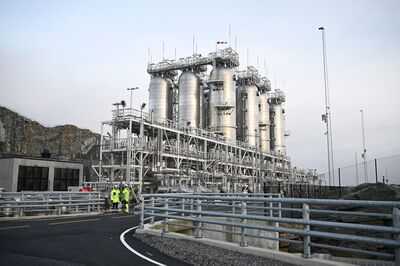
MPs have sounded the alarm over the Government's £22bn investment on "unproven" carbon-capture , flagging it as a high-risk venture.
The Parliamentary Public Accounts Committee (PAC) has urged the Government to reevaluate its support for carbon capture utilisation and storage (CCUS) in the UK, questioning whether such an investment is economically viable for both taxpayers and consumers amid soaring and the escalating cost-of-living crisis.
The committee highlighted that roughly a quarter of the £21.7bn funding over 25 years for early CCUS projects is expected to be sourced from taxes, while the remaining three-fourths will burden consumers, who are already grappling with some of the highest energy costs globally.
With the Department for Energy Security and Net Zero's (DESNZ) failure to put in safeguards ensuring that taxpayers and consumers reap financial rewards from a successful CCUS programme, along with not examining the potential financial fallout for households, MPs expressed concern.
Capturing carbon emissions, generated by burning fossil fuels or during industrial activities like cement manufacturing, and storing them permanently undergroundfor instance, in depleted oil fields beneath the seais what CCUS entails. Institutions like the International Energy Agency (IEA) and the Climate Change Committee tout CCUS as a pivotal solution for hitting targets aimed at reducing the greenhouse gases fuelling dangerous climate change.
After years of effort to launch CCUS initiatives, the previous government pledged £20bn in March 2023 for the early roll-out of the technology, while in October 2024, Labour announced £21.7bn for two "carbon capture clusters" in Teesside and Merseyside.
However, PAC has raised alarms that CCUS may fall short of achieving the carbon reduction levels or the timelines necessary to hit climate goals. The Government is being cautioned by the committee against putting too much stock in this programme at the cost of other methods to reduce the UK's emissions to net zero by 2050, such as investing in renewable energy, according to their report.
The MPs also highlighted the "high degree of uncertainty as to whether these risky investments in unproven technologies present best value for money for taxpayers and consumers", especially when compared to alternative carbon-cutting strategies, except in a few cases where options are limited, like in the cement industry.
According to the report, the Government scaled back its ambitions for CCUS in 2024 from the initial targets of capturing 20 to 30 million tonnes of carbon dioxide annually by 2030, casting doubt on how it will fulfil emissions reduction commitments.
The committee further cautioned that employing CCUS for liquid natural gas wouldn't tackle upstream emissions, which include potent greenhouse gases. MPs have expressed concerns about using CCUS technology to capture emissions from bioenergy, targeting "negative" emissions to counterbalance other pollution with serious questions around the true sustainability and carbon savings of burning wood for power and capturing the carbon.
Committee Chairman Sir Geoffrey Clifton-Brown commented on the financial impact: "This £21.7bn policy is going to have a very significant effect on consumers and industry's electricity bills. Whether this is acceptable remains to be seen. All early progress will be underwritten by taxpayers, who currently do not stand to benefit if these projects are successful.
"Any private sector funding for such a project would expect to see significant returns when it becomes a success. We were surprised that the Government had not even considered this aspect."
Furthermore, he urged the Government to keep up-to-date with new science regarding CCUS and to adjust their strategies accordingly. He also pointed out the noticeable gap in achieving net zero following last years downscaling of CCUS ambitions.
The report calls for regular assessments of taxpayer and consumer risks associated with CCU projects, the implementation of mechanisms for upcoming schemes to enable public financial gains, and for the Treasury to verify the overall affordability of the complete programme.
The Government is also urged to provide its reasoning for backing CCUS in each sector where it could be implemented, promptly establish new goals for capturing emissions, clarify how it will compensate for any shortfall in meeting targets, and contemplate how it will track and report on the amount of carbon captured.